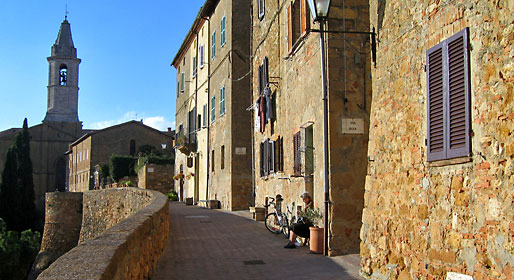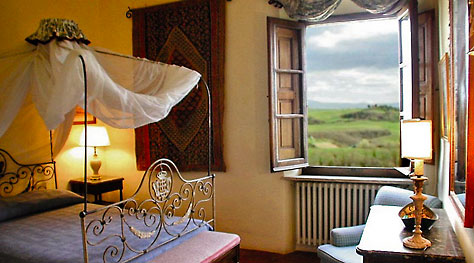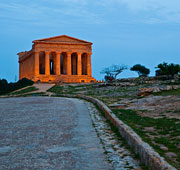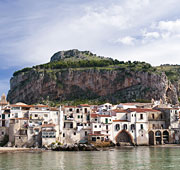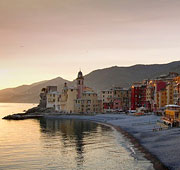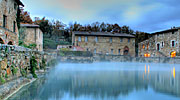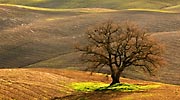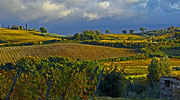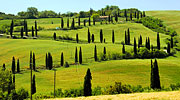Towns of Val d'Orcia
Traveling along the via Cassia, on a journey deep into the heart of Tuscany
Gently undulating hillside and lush green valleys traversed by the Orcia river and the ancient via Cassia. This is the Val d'Orcia, a place where to admire both the enchanting landscapes and the picturesque towns of the Tuscan countryside.
Made in Montalcino
Following the Via Francigena, this itinerary commences in the medieval hill top town of Montalcino, where the Brunello di Montalcino, one of Italy's most famous wines, is produced.
The imposing Rocca di Montalcino, occupying a strategic position overlooking all potential access points, defended the town from attack for centuries. Amidst the narrow roads of the historic center, important works of architecture can be seen. The Church of Sant Egidio and the Church of Sant'Agostino were both built in the 14th century, whilst the cathedral, constructed on the site of an ancient 9th century house of worship, dates back to the neoclassical period.
Another masterpiece of religious architecture, the Abbey of Sant Antimo, is situated just a few kilometers from Montalcino.
Legend has it that this splendid example of Tuscan Romanesque was built on the site of the votive chapel erected by Charlemagne so as to conserve the relics of Saint Sebastian and Saint Antimo
Towers and gardens
Like Montalcino, nearby San Quirico d'Orcia is of ancient origin. The town's historic center, enclosed within sturdy perimeter walls, boasts some fourteen medieval towers.
Although the foundation of San Quirico dates back to the time of the Etruscans, it was in the middle ages and the renaissance that the town's most important edifices were erected. The Collegiate Church of Saints Quirico and Giulitta was built in the Romanesque period, some three centuries or so before the town's Horti Leonini were constructed.
The Horti Leonini provide a unique example of renaissance style Italian gardens, created on terrain given to Diomede Leoni as a gift by Francesco I dei Medici in 1581.
Big names in little places
Whilst San Quirico d'Orcia is known for its gardens, Bagno Vignoni is famous for the 16th century baths lying at its center and filled with thermal water which arrives at a temperature of 50° directly from the tiny little town's volcanic springs.
Known since Roman times, the health-inducing properties of Bagno Vignoni's water were, apparently, much appreciated by Saint Catherine of Siena, to whom the small sanctuary situated directly opposite the baths is dedicated
The symbol of Castiglione d'Orcia is, without doubt, its impressive Rocca degli Aldobrandeschi, stronghold situated in the highest point of the town, and from where a spectacular view of the entire valley can be admired.
Castiglione d'Orcia was the birthplace of Lorenzo di Pietro, painter better known by the name of Vecchietta and after whom the town's main square, with unusual cobbled paving and geometric designs, has been named.
Say "cheese"!
This itinerary draws to a close in Pienza, the Ideal Renaissance City. When the town's most illustrious citizen, Enea Silvio Piccolomini, became Pope Pius II, he ensured that his birthplace got a serious face-lift, which would respect, to the letter, the canons of renaissance aesthetics.
The experiment was a resounding success, and resulted in a stunning trapezoidal piazza, a cathedral by Bernardo Rossellino, and the elegant Palazzo Borgia and Palazzo Piccolomini.
Renaissance perfection aside, a trip to Pienza offers visitors the opportunity to stock up on the town's world famous Pecorino cheese, to taste and purchase in the various delicatessens lining the streets of the historic center!

